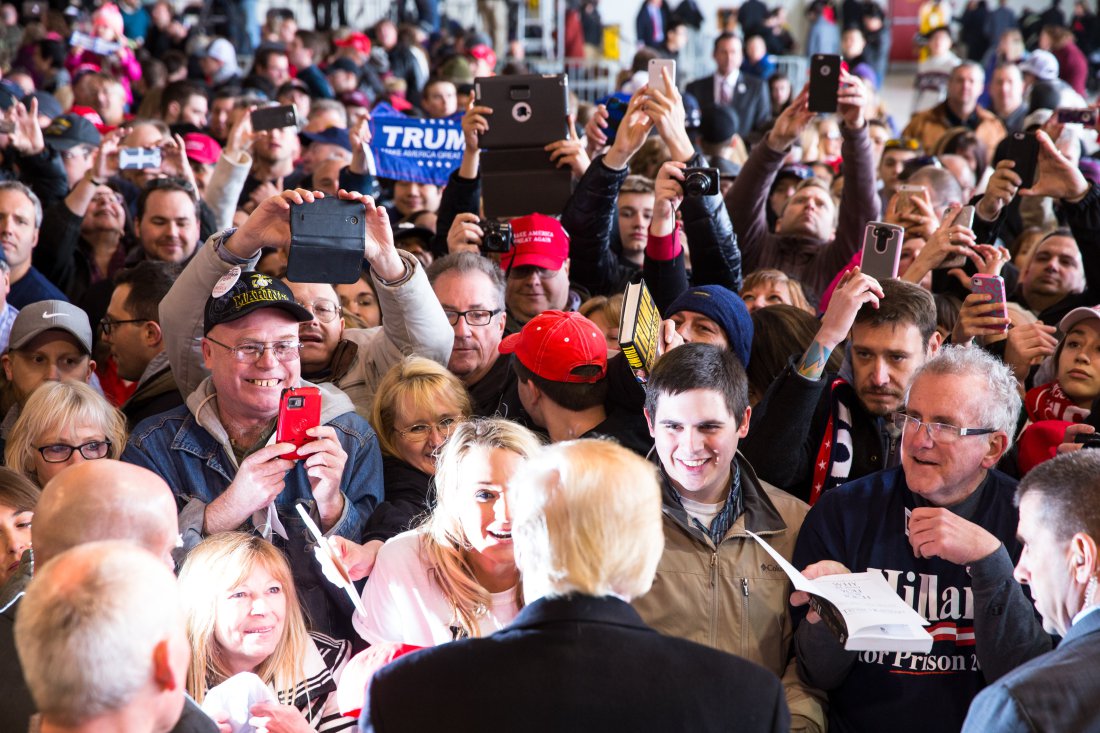|
Image of Donald Trump with supporters. From Time.com. There is an ongoing debate about what made Trump a viable and victorious candidate in 2016 preventing democrats, liberals and progressives from responding effectively to their political wrecking. For example, Carol Anderson, professor of African American Studies at Emory University and author of White Rage (2016), penned an essay on November 16, 2016 called “Donald Trump is the Result of White Rage, Not Economic Anxiety,” summing up how white rage propelled Trump to the White House. A day later the notable progressive, Dr. Cornel West, asserted, “Trump’s election was enabled by the policies that overlooked the plight of our most vulnerable citizens,” in his opinion piece for the Guardian, “Goodbye, American Neoliberalism. A New Era is Here.” What we see is a clash between two perspectives: one sees desperation for economic relief as the major reason why white voters’ chose Trump; the other observes contempt for racial equality and black progress as the predominant motive for Trump’s white voters. For the most part, West blames President Barack Obama, who he accuses of being a neoliberal—someone who seeks to privatize social programs and natural resources, deregulate the market and trade, decentralize the government and restore class power, rather than remedy these ills of capitalism. “The abysmal failure of the Democratic party to speak to the arrested mobility and escalating poverty of working people,” West sums up, “unleashed a hate-filled populism and protectionism that threaten to tear apart the fragile fiber of what is left of US democracy.” In other words, Trump is the chosen savior for the economically wretched. Though he has moderated his claim on how much Obama’s policies contributed to Trump’s success, West continues to understate the influence of racism. In essence, he and others echo what white voters say to justify their vote for Trump.
But the economic angst motive does not explain why Trump won only 8% of black voters, whose economic recovery, as a whole, was much slower than that of Hispanics and whites. Second, even if one accepts West’s claim that Obama is a neoliberal, his argument does not account for why Trump’s base presently supports his deregulation spree and the Republican tax plan, which provide larger tax cuts for wealthy individuals and big corporations than it does for the working- and middle-classes. The economic view seems to be incorrect, or insufficient at best. Exit polls, Pulitzer-prize winning Will Bunch’s journalism on the rise of the Obama backlash, and Carol Anderson’s history of white resentment tell a more comprehensive and compelling motif in American politics. According to poll data, the power behind Trump’s presidency is the white vote, winning the majority of white voters in every subcategory except one. Trump fared well among non-college educated (67%-28%) and the college educated (49%-45%); among men (63%-31%) and women (53%-43%); and among wealthy, middle-class and working-class whites; and among white Protestants and Catholics; The white vote made it very clear that Trump was its preferred candidate. I am not saying Trump’s voters have a monolithic agenda. But if we combine the overwhelming support of white voters with Trump’s campaign rhetoric and promises—such as the wall, Muslim ban, MAGA—we do not have to look far to observe how racism, bigotry, misogyny, xenophobia mobilized Trump’s white supporters, who have been waiting for their champion. But there is more to this story. Will Bunch in the Backlash (2011) reports on the individuals and groups that joined the backlash to Obama’s 2008 election. Bunch notes a multiplicity of frustrations, of which economic despair is only one, incubating since the 1960s. His interviews describe a virulent reaction to an emerging multicultural constituency led by a progressive black man championing a liberal agenda. In 2011 before Trump was a character of concern in West’s prophecies, Bunch observed that Trump’s “proposed candidacy—which may well have dissolved into a cheap publicity stunt by the time you read this—put the lie to the notion that the Tea Party Movement was all about America’s exploding debt and was nothing personal against Obama.” Little did Bunch know at the time, Trump’s stunt wasn’t cheap. In fact, Trump’s unapologetic interrogation of Obama’s American citizenship in May 2011, suggesting that Obama was an illegal Kenyan or Muslim, unlike the birthers whom Trump regard as “really great American people” and “hard working, unbelievable, salt of the earth people”, became a worthwhile investment that earned him the White House in 2016. Evidently, Bunch’s unheeded prophecy revealed an imminent backlash less concerned with neoliberalism as it was with a neo-black politician. Carol Anderson, in her book White Rage, exposes a longer history of uncompromising contempt for any form of black progress and racial equality since the end of slavery up to Trump’s election. Anderson points out how freed slaves who sought to be economically independent, unite their families, migrate away from KKK infested towns, erect good schools, pursue a college education, exercise their right to vote, run for office triggered white rage. However, she concludes: “the truth is that, despite all this, a black man was elected president of the United States: the ultimate advancement, and thus the ultimate affront.” In short, Obama’s eight years of power triggered and engendered Trump’s campaign. This perspective offers a reasonable account of the irony of white working- and middle-classes’ loyalty to a billionaire aggressively advancing the kinds of economic policies that, according to West and others, have that failed them. The question facing this view is: why did whites vote for Obama in 2008, in the first place? By no means should we reduce the discussion on Trump’s triumph to the two viewpoints I presented, as there are multiple factors to consider. In any case, the white vote’s preference for Trump should remind democrats, liberals and progressives that racism and other anti-democratic sentiments continue to profoundly influence most white voters’ decisions. Hence, we will do well to remember that economic conditions are not always the predominant factors determining which politicians and policies white voters support. Perhaps, the same can be said about racist inclinations in general, but in the context of American history they tend to be more dominant than the latter. Whites have excluded blacks from equally and fully participating in every economic program in American history—from the Hamiltonian and Jeffersonian economic plans, the Gilded Age, the southern populist movement, the rise of the labor unions, Theodore Roosevelt’s progressivist movement to FDR’s New Deal. And, the epoch of Keynesian economics—the economic Golden Age for modern progressives—lasted until the Civil Rights Movement succeeded in dismantling the legal obstacles to the social and economic privileges of full citizenship for people of color. Thus, white resentment led many whites to vote against the New Deal policies and institutions that protected them from neoliberalism, to prevent blacks from receiving the same economic security and opportunities. It seems to me that only when the white majority embraces social and political equality for African Americans and minorities or loses its grip on the electoral vote will America have a shot at redressing income and wealth inequality.
0 Comments
Leave a Reply. |
About the blogThis is Kasaun's blog on the significance of voting, particularly in America. The goal is to get every American voting in local and national elections. Archives
July 2018
Categories |


 RSS Feed
RSS Feed
